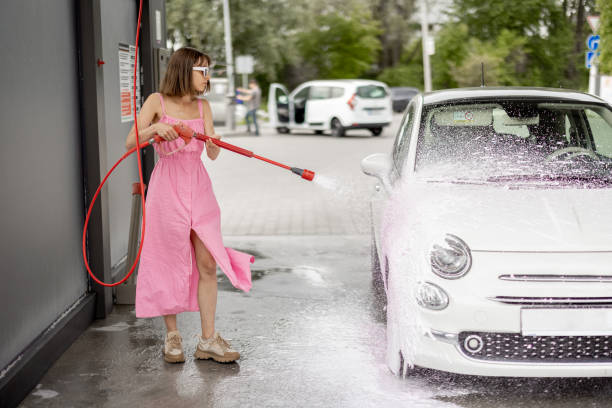When it comes to washing your car, there are numerous methods to choose from. From hand washing to automatic car washes, places like Carmel and Car Spa offer various methods and each has its own pros and cons. However, if you prioritize the safety and protection of your vehicle, selecting the safest car wash method becomes crucial.
As a general rule, hand washing is considered the safest type of car wash. This method allows for a gentle, efficient, and effective cleaning process, while giving you control over the washing technique and choice of cleaning agents.
While other car wash methods are not necessarily harmful to your car, a hand wash ensures the highest level of safety.
If you have been using a different car wash method and are unsure about its safety, continue reading to find out if your current method is safe or if there are safer alternatives available.
The Safest Car Wash Method
Car detailing experts universally recommend hand washing as the safest method for washing your car. Whether you utilize the two-bucket method or employ a high-tech pressurized foam cannon, a careful hand wash guarantees a satisfying result for your vehicle.
A hand wash allows you to effectively remove dirt, water spots, grime, and other contaminants from your car’s surface. By following a meticulous process that involves prewashing, using a foam cannon, preparing two buckets, and gently washing with a mitt, you can ensure a thorough and careful cleaning.
One of the major advantages of a hand wash is the ability to target and clean even the most hard-to-reach areas that automatic car washes may miss.
Hand washing also eliminates the need for harsh scrubbing or the use of abrasive chemicals, thus minimizing the risk of scratches and damage to your car’s paint.
Moreover, drying your car after a hand wash is more precise, leaving no water spots or scratches behind. And once you finish the wash, you can also opt for interior detailing or apply wax to further enhance the appearance and protection of your car.
Pros of Handwash
- Leaves little to no scratches on cars.
- Effectively removes contaminants.
- Efficient cleaning.
- Ideal for new cars.
Cons of Handwash
- Takes more time compared to other car wash methods.
- Can be more expensive than alternative washes.
- Requires a significant amount of water without recycling options.
- Challenging to perform in limited spaces.
Touchless Car Wash – The Next Safest Option
After hand washing, the next safest method is the touchless car wash. This type of car wash utilizes chemicals, high-pressure water, and air to clean your vehicle without the need for brushes or physical contact.
A touchless car wash minimizes the risk of scratches on your car’s surface, as the cleaning process relies on chemical agents to effectively remove dirt, grime, and other contaminants. It offers a quick and time-saving solution, although it comes with certain disadvantages.
Pros of Touchless Car Wash
- Quick and efficient.
- Minimizes scratching.
- Less expensive than a hand wash.
Cons of Touchless Car Wash:
- Uses harsh chemicals that can potentially damage the car’s finish.
- Less effective in removing heavy contamination.
- More expensive compared to brushless and automatic car washes.
Brushless Wash (Soft-touch): Proceed with Caution
The brushless wash, also known as a soft-touch automatic car wash, replaces brushes with soft strip cloth in its machinery. This method is designed to gently remove dirt from your car’s surface.
While the idea of a brushless wash may sound appealing, it is not the optimal choice for the safety of your vehicle. The cloth used in these washes can transfer contaminants from one car to another, potentially damaging your vehicle. Moreover, like touchless car washes, brushless washes often employ harsh chemicals that can harm your car’s paint.
Pros of Brushless Wash:
- Quick and convenient.
- Relatively inexpensive.
- Less abrasive compared to brush automatic car washes.
Cons of Brushless Wash:
- Uses harsh chemicals that can damage the car’s finish.
- May leave noticeable scratches on the car’s surface.
- Does not effectively remove heavy contaminants.
Automatic Car Wash: Proceed with Caution
Automatic car washes, also known as tunnel washes, rank lower in terms of safety compared to the aforementioned methods. In this type of car wash, you drive your vehicle onto a conveyor belt that takes you through a series of brushes and blowers for cleaning.
While automatic car washes offer convenience and affordability, they can potentially cause scratches on your car’s surface. Furthermore, these washes often utilize harsh chemicals and wash soap with abrasives, which can damage your car’s coating or wax.
Pros of Automatic Car Wash:
- Convenient and affordable.
- Quick.
Cons of Automatic Car Wash:
- May dry out the paint and cause color fading.
- Uses harsh chemicals.
- Can leave noticeable scratches.
- Ineffective in removing heavy contaminants.
Rain: Not the Best Choice
Some car owners may opt to let their cars be cleaned by rain, considering it a convenient and cost-effective method. While rain can rinse off some dirt, it is not a reliable option for serious cleaning.
Rainwater can leave behind contaminants and dirt on your car’s surface without actually removing them. Additionally, it can lead to water spots that may pose problems if left unaddressed. Rain can also attract more dirt and dust, leaving your car even dirtier than before.
Pros of Rain:
- Convenient and low effort.
- Low cost.
Cons of Rain:
- Rainwater is often acidic.
- Can leave water spots on your car.
- May leave your car dirtier than it was.
- Rain attracts additional dirt and dust.
- Risk of accumulating more contaminants on your car’s surface.
- Can be detrimental to your car’s finish.
With the abundance of car wash options available, selecting the right method for your vehicle can be challenging. While convenience and cost often dictate people’s choices, it is crucial to prioritize the safety and protection of your car.
Learn more here:
